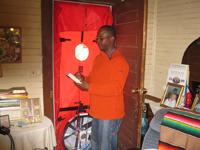WEATHERIZATION
 The Weatherization Assistance Program enables low-income families to permanently reduce their energy bills by making their homes more energy efficient.
The Weatherization Assistance Program enables low-income families to permanently reduce their energy bills by making their homes more energy efficient.
During the last 32 years, the U.S. Department of Energy's (DOE) Weatherization Assistance Program has provided weatherization services to more than 6.2 million low-income families.
Through this program, weatherization service providers install energy efficiency measures in the homes of qualifying homeowners free of charge. These are not expensive upgrades-the average expenditure limit is $6,500 per home-but they are effective, and energy savings pay for the upgrades within a few years. DOE documents the savings and compares them against costs, so that over the years it can determine the efficacy of these measures.
 Weatherization has helped spawn an energy efficiency industry for residential housing. This industry today employs thousands of people who work in low-income weatherization alone, and many times that number work in companies that help homeowners increase their energy efficiency through low-cost measures. Many of the techniques that are today standard procedure in this industry were first developed and tested by the Weatherization Program. And through weatherization, DOE continues to develop and test in the field new advances in home energy science.
Weatherization has helped spawn an energy efficiency industry for residential housing. This industry today employs thousands of people who work in low-income weatherization alone, and many times that number work in companies that help homeowners increase their energy efficiency through low-cost measures. Many of the techniques that are today standard procedure in this industry were first developed and tested by the Weatherization Program. And through weatherization, DOE continues to develop and test in the field new advances in home energy science.
Some of the methods used to insulate a home are weather stripping, caulking, replacing deteriorated doors, insulating floors, attics, and walls, as well as repairing broken window panes. Operation Breakthrough's WAP also runs the Heating & Air Replacement Program (HARRP) when funds are available to repair or replace heating and air units. You must apply for Weatherization Services to be eligible for all departmental programs.
 It's a fact: weatherization works! In the 3 decades since its founding in 1976, U.S. Department of Energy's (DOE) Weatherization Assistance Program has provided weatherization services to more than 6.2 million low-income families. It is a record of service to some of society's neediest citizens that also benefits our nation by reducing our energy dependency, improving the environment, and stimulating economic development in low-income communities.
It's a fact: weatherization works! In the 3 decades since its founding in 1976, U.S. Department of Energy's (DOE) Weatherization Assistance Program has provided weatherization services to more than 6.2 million low-income families. It is a record of service to some of society's neediest citizens that also benefits our nation by reducing our energy dependency, improving the environment, and stimulating economic development in low-income communities.